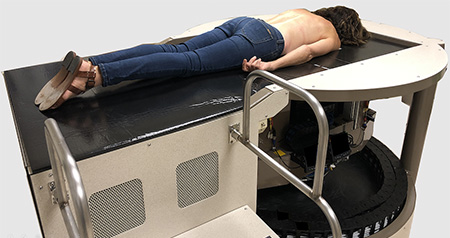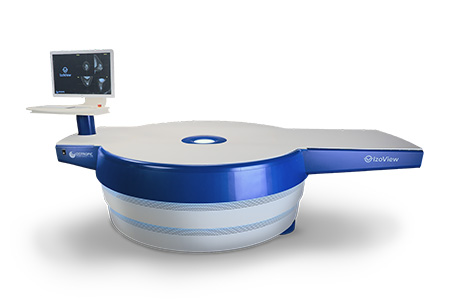Breast CT scanner invented at UC Davis is closer to commercialization
Economic development project continues to evolve with the hope that FDA clinical trials will begin next year
Mammography and its cousin technology digital tomosynthesis have saved countless lives by helping diagnose breast cancer when it is treatable. Magnetic Resonance Imaging (MRI) is also used at UC Davis Health breast imaging, often in women who are at high risk of breast cancer. Now, a third option is emerging as a promising diagnostic technology: Breast computed tomography (CT).

Breast CT is more comfortable for women. During a mammogram, breasts are compressed and that can be painful. With the breast CT system, women lie on their stomachs on a table containing holes through which breasts drop into a pendant position for scanning.
The fully three-dimensional, high-resolution breast CT scanner could revolutionize breast cancer detection because research shows it may be able to catch breast cancer in its earliest stages.
What makes it different is its ability to detect mass lesions, with adequate detection of microcalcifications, or small calcium deposits, as well. Both mass lesions and microcalcifications can be indicators of potential early-stage breast cancer.
UC Davis researchers recently studied the ability of breast CT to detect these small calcium deposits. They used a computer simulation to embed likenesses of microcalcifications of different sizes and locations into breast CT images, then used artificial intelligence to track them. The results were published in the journal Medical Physics.
“Breast CT is a promising tool for the early detection of breast cancer,” said Shadi Aminololama-Shakeri with the UC Davis Department of Radiology breast imaging program. “Visualization of microcalcifications, which may be the size of grains of sand and smaller, have posed a challenge since the development of the early breast CT prototypes. We are continuing to see improvement with the scanner so we can confidently use it in the clinical realm with the goal of early detection for optimal treatment of breast cancer.”
A Canadian public company, Izotropic Corp., was formed to manufacture the UC Davis-based design of the breast CT scanner on a larger scale. The company has licensed several UC Davis-owned patents.
While the design of the commercial scanner differs from the model created at UC Davis, the experience of UC Davis researchers helped shape the new scanner.
“As an example of the type of academic and industry partnerships we are trying to grow here at the cancer center, we are getting closer to celebrating the commercialization of the breast CT scanner that was invented here at the Boone Lab,” UC Davis Comprehensive Cancer Center Director Primo “Lucky” Lara Jr. said.

In 2004, John Boone and his team were the first in the world to perform a cone beam breast CT examination on a patient. The latest generation of the CT scanner designed and tested at UC Davis achieved nearly four times the spatial resolution of the earlier scanners.
“The fourth UC Davis scanner, called the Doheny, is more advanced than earlier systems that we developed,” said Boone, a distinguished professor at the UC Davis Department of Radiology and the Department of Biomedical Engineering. “This is due to the combination of a pulsed X-ray source, a smaller focal spot, a higher resolution flat-panel detector, and more advanced CT reconstruction algorithms.”
The Doheny has now evolved into the IzoView, which is in the final stages of completion. The company hopes to engage in U.S. Food and Drug Administration (FDA) trials in the next year. Boone and Aminololama-Shakeri have a financial interest in Izotropic, for which Boone is a director.
“We’re very excited about the prospect of this economic development project and look forward to following its progress,” Lara said.
UC Davis breast CT clinical trials
UC Davis has conducted phase II clinical trials with the Doheny scanner to compare its performance with mammography, breast tomosynthesis and MRI. More than 600 patients have participated by undergoing breast CT scans. Researchers are evaluating the results of those clinical trials.
The breast CT program at UC Davis was funded by the National Institutes of Health and other research organizations and has attracted over $20 million in external research funding.
“With dozens of graduate students, colleague radiologists in the breast imaging center and staff researchers, we have improved the design of the UC Davis breast CT systems over the past 25 years, with a commensurate improvement in imaging performance,” Boone said. “The Izotropic breast CT system [Izoview] is the culmination of the UC Davis efforts and is designed to be a cost-effective clinical tool.”
Boone added that he expects the scanner to improve the lives of innumerable breast cancer patients after Izotropic achieves FDA clearance for the system.
UC Davis Comprehensive Cancer Center
UC Davis Comprehensive Cancer Center is the only National Cancer Institute-designated center serving the Central Valley and inland Northern California, a region of more than 6 million people. Its specialists provide compassionate, comprehensive care for more than 100,000 adults and children every year and access to more than 200 active clinical trials at any given time. Its innovative research program engages more than 240 scientists at UC Davis who work collaboratively to advance discovery of new tools to diagnose and treat cancer. Patients have access to leading-edge care, including immunotherapy and other targeted treatments. Its Office of Community Outreach and Engagement addresses disparities in cancer outcomes across diverse populations, and the cancer center provides comprehensive education and workforce development programs for the next generation of clinicians and scientists. For more information, visit cancer.ucdavis.edu.




